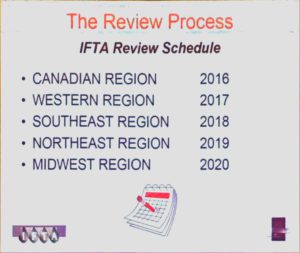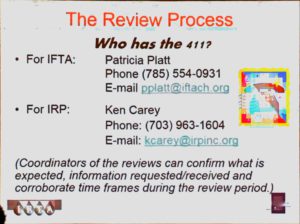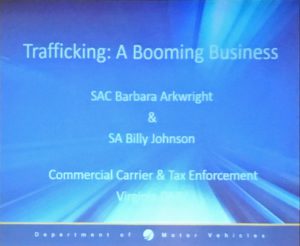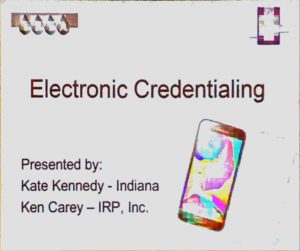After the basic housekeeping, introductions and Sandy Johnsons beautiful renditions of both the US and Canadian anthems we got right down to business.
State Peer Review
Peer Reviews of IFTA and IRP Plans were discussed at the meeting. The peer review auditors are looking to ensure that the states processes and procedures are in line with the IFTA and IRP Plans, they are not looking penalize states for clerical errors. The importance of communication was stressed repeatedly and asking questions are not counted against you, so the states are free to ask as many as they need. States should reach out to Patricia Plat for IFTA: pplatt@iftach.org and Ken Carey for IFTA: kcarey@irpinc.org


Industry Hot Topics
Then we moved on to Industry Hot Topics. Gary Markham from ProMiles discussed the use of “fuel price averages” and showed how they may differ from rout to rout. He suggested that if an auditor is going to use fuel averages, they should pull not the “national” average, but the average that most closely resembles the routs of travel to get the taxes calculated correctly.
Bob Pitcher from the ATA discussed decals, both regular and electronic. He stressed several times throughout the conference that getting rid of paper decals, is not the same thing as requiring paper decals. Pitcher’s believes everything can be tied to a license plate and a DOT number, and stressed the importance of only applying technology where it will make things better.
Dave Gray President of NATSA discussed an Industry Best Practice Principals Survey. This survey was written and designed with the help of the states, the IFTA & IRP Plans, and industry professionals. The goal is to determine which states are exercising the mission of both IFTA and IRP – to promote the full use of the highway system – the best and which could use some help. The survey is on going and available below If you have any feedback, please participate!
Survey here: https://kwiksurveys.com/s/jatsisd4kottqnk525843
Trafficking
We then had a presentation on trafficking from Special Agent Billy Johnson and Special Assistant in Charge Barbara Arkwright. Johnson discussed Human Trafficking and Arkwright discussed Tobacco Trafficking.

Human Trafficking is a movement of people for the purpose of some kind of forced labor and differs from kidnapping and smuggling because of the continued contact after the movement. He told us some chilling stores from his home state of Virginia where young people are especially at risk. According to Johnson the average age of a child trafficked into the sex trade ranges 11-14 years old, and it’s not always “at risk kids” who are targeted. Often children from “wealthy neighborhoods” are even allowed to go home at night and are forced into labor between when they get out of school and when they go home.
Human Trafficking is second only to drug trafficking and Arkwright was there to discuss Tobacco Trafficking. She stressed that it isn’t just a tax issue, it’s about the violence and other crime that goes hand and hand with it. In one case in New York, the profits from Tobacco Trafficking were being used to finance meth labs, in other cases it’s been linked to funding terrorism, fraud and identity theft.
The officers spoke together to praise the efforts of www.TruckersAgainstTrafficking.org. Be sure to check out their website if you have a moment because it’s full of really useful materials you can share with customers and drivers. According to the officers it is helping save lives.
Electronic Credentials
Electronic Credentials was a HUGE hot topic during the entire conference with a separate article to come. Between Pitcher representing the ATA, and all the various jurisdictions in attendance, there was a lot to say and a lot to learn.

That does it for my wrap up of Day 1! Check back soon for more details about Day 2.
Written by Casey Bullard
